Xuan Qi
Difficulty-Based Preference Data Selection by DPO Implicit Reward Gap
Aug 06, 2025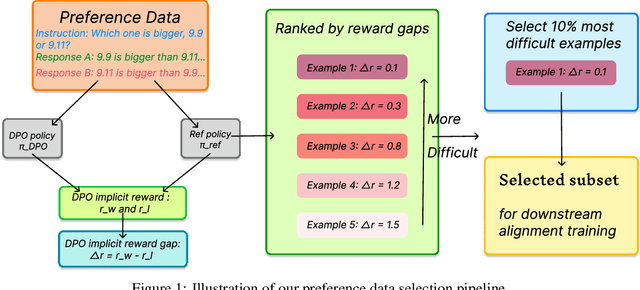
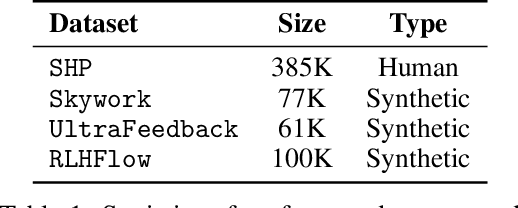
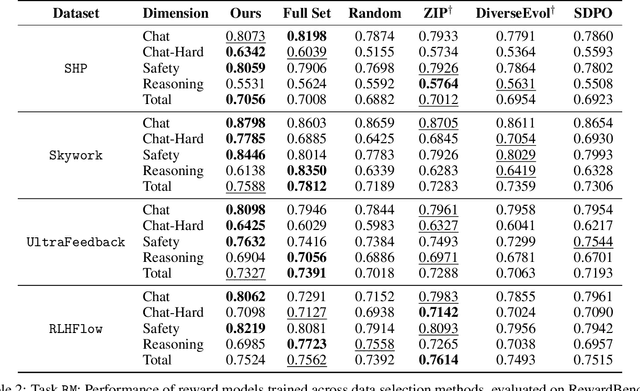
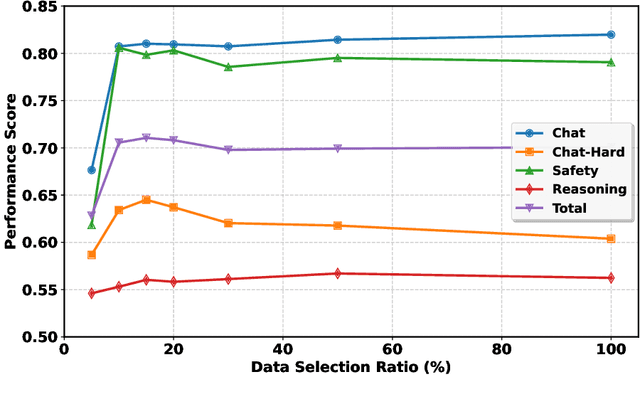
Abstract:Aligning large language models (LLMs) with human preferences is a critical challenge in AI research. While methods like Reinforcement Learning from Human Feedback (RLHF) and Direct Preference Optimization (DPO) are widely used, they often rely on large, costly preference datasets. The current work lacks methods for high-quality data selection specifically for preference data. In this work, we introduce a novel difficulty-based data selection strategy for preference datasets, grounded in the DPO implicit reward mechanism. By selecting preference data examples with smaller DPO implicit reward gaps, which are indicative of more challenging cases, we improve data efficiency and model alignment. Our approach consistently outperforms five strong baselines across multiple datasets and alignment tasks, achieving superior performance with only 10\% of the original data. This principled, efficient selection method offers a promising solution for scaling LLM alignment with limited resources.
A Survey of Self-Evolving Agents: On Path to Artificial Super Intelligence
Jul 28, 2025

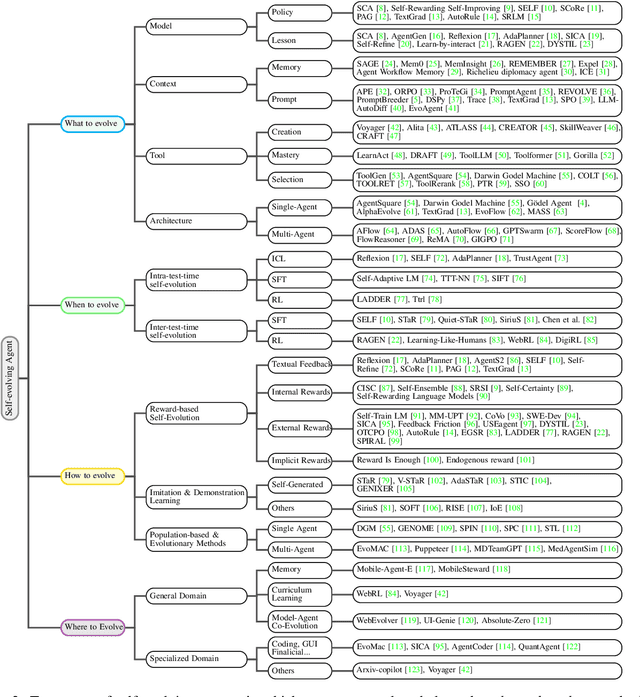
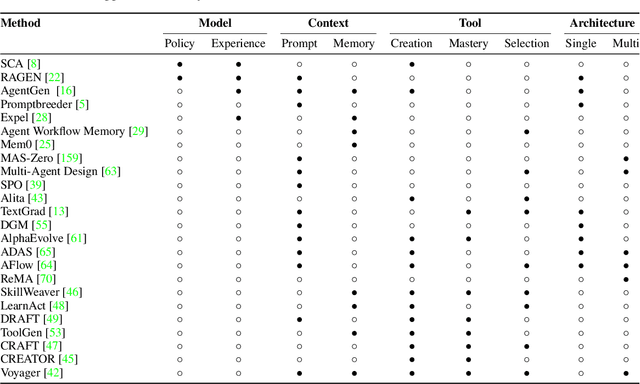
Abstract:Large Language Models (LLMs) have demonstrated strong capabilities but remain fundamentally static, unable to adapt their internal parameters to novel tasks, evolving knowledge domains, or dynamic interaction contexts. As LLMs are increasingly deployed in open-ended, interactive environments, this static nature has become a critical bottleneck, necessitating agents that can adaptively reason, act, and evolve in real time. This paradigm shift -- from scaling static models to developing self-evolving agents -- has sparked growing interest in architectures and methods enabling continual learning and adaptation from data, interactions, and experiences. This survey provides the first systematic and comprehensive review of self-evolving agents, organized around three foundational dimensions -- what to evolve, when to evolve, and how to evolve. We examine evolutionary mechanisms across agent components (e.g., models, memory, tools, architecture), categorize adaptation methods by stages (e.g., intra-test-time, inter-test-time), and analyze the algorithmic and architectural designs that guide evolutionary adaptation (e.g., scalar rewards, textual feedback, single-agent and multi-agent systems). Additionally, we analyze evaluation metrics and benchmarks tailored for self-evolving agents, highlight applications in domains such as coding, education, and healthcare, and identify critical challenges and research directions in safety, scalability, and co-evolutionary dynamics. By providing a structured framework for understanding and designing self-evolving agents, this survey establishes a roadmap for advancing adaptive agentic systems in both research and real-world deployments, ultimately shedding lights to pave the way for the realization of Artificial Super Intelligence (ASI), where agents evolve autonomously, performing at or beyond human-level intelligence across a wide array of tasks.
AgentDistill: Training-Free Agent Distillation with Generalizable MCP Boxes
Jun 17, 2025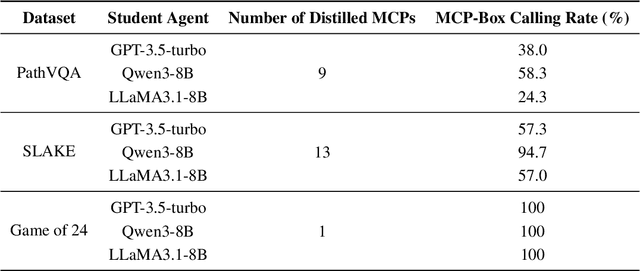
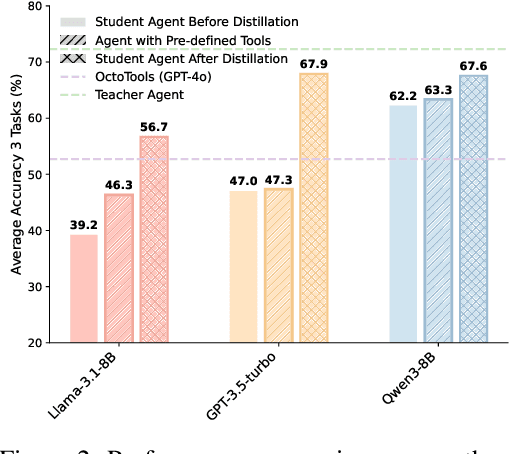
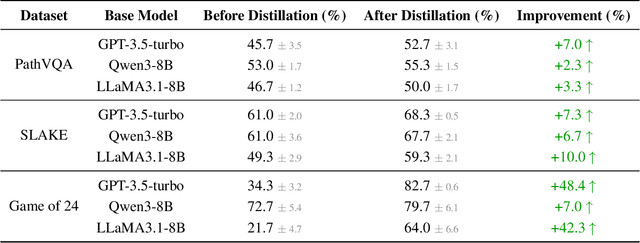

Abstract:While knowledge distillation has become a mature field for compressing large language models (LLMs) into smaller ones by aligning their outputs or internal representations, the distillation of LLM-based agents, which involve planning, memory, and tool use, remains relatively underexplored. Existing agent distillation methods typically replay full teacher trajectories or imitate step-by-step teacher tool usage, but they often struggle to train student agents to dynamically plan and act in novel environments. We propose AgentDistill, a novel, training-free agent distillation framework that enables efficient and scalable knowledge transfer via direct reuse of Model-Context-Protocols (MCPs), which are structured and reusable task-solving modules autonomously generated by teacher agents. The reuse of these distilled MCPs enables student agents to generalize their capabilities across domains and solve new problems with minimal supervision or human intervention. Experiments on biomedical and mathematical benchmarks demonstrate that our distilled student agents, built on small language models, can achieve performance comparable to advanced systems using large LLMs such as OctoTools (GPT-4o), highlighting the effectiveness of our framework in building scalable and cost-efficient intelligent agents.
Alita: Generalist Agent Enabling Scalable Agentic Reasoning with Minimal Predefinition and Maximal Self-Evolution
May 26, 2025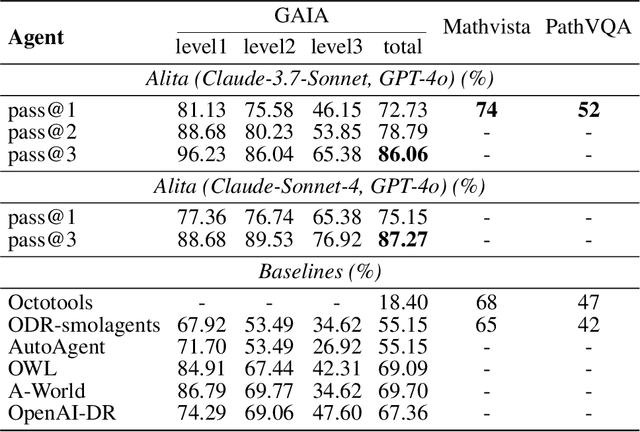
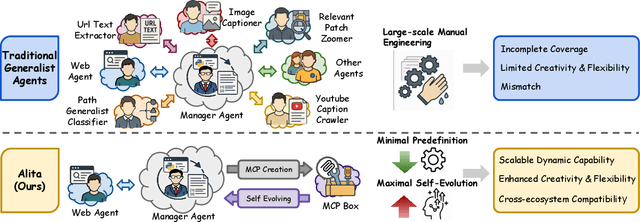
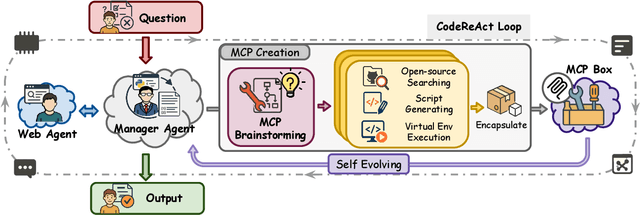

Abstract:Recent advances in large language models (LLMs) have enabled agents to autonomously perform complex, open-ended tasks. However, many existing frameworks depend heavily on manually predefined tools and workflows, which hinder their adaptability, scalability, and generalization across domains. In this work, we introduce Alita--a generalist agent designed with the principle of "Simplicity is the ultimate sophistication," enabling scalable agentic reasoning through minimal predefinition and maximal self-evolution. For minimal predefinition, Alita is equipped with only one component for direct problem-solving, making it much simpler and neater than previous approaches that relied heavily on hand-crafted, elaborate tools and workflows. This clean design enhances its potential to generalize to challenging questions, without being limited by tools. For Maximal self-evolution, we enable the creativity of Alita by providing a suite of general-purpose components to autonomously construct, refine, and reuse external capabilities by generating task-related model context protocols (MCPs) from open source, which contributes to scalable agentic reasoning. Notably, Alita achieves 75.15% pass@1 and 87.27% pass@3 accuracy, which is top-ranking among general-purpose agents, on the GAIA benchmark validation dataset, 74.00% and 52.00% pass@1, respectively, on Mathvista and PathVQA, outperforming many agent systems with far greater complexity. More details will be updated at $\href{https://github.com/CharlesQ9/Alita}{https://github.com/CharlesQ9/Alita}$.
On Path to Multimodal Historical Reasoning: HistBench and HistAgent
May 26, 2025Abstract:Recent advances in large language models (LLMs) have led to remarkable progress across domains, yet their capabilities in the humanities, particularly history, remain underexplored. Historical reasoning poses unique challenges for AI, involving multimodal source interpretation, temporal inference, and cross-linguistic analysis. While general-purpose agents perform well on many existing benchmarks, they lack the domain-specific expertise required to engage with historical materials and questions. To address this gap, we introduce HistBench, a new benchmark of 414 high-quality questions designed to evaluate AI's capacity for historical reasoning and authored by more than 40 expert contributors. The tasks span a wide range of historical problems-from factual retrieval based on primary sources to interpretive analysis of manuscripts and images, to interdisciplinary challenges involving archaeology, linguistics, or cultural history. Furthermore, the benchmark dataset spans 29 ancient and modern languages and covers a wide range of historical periods and world regions. Finding the poor performance of LLMs and other agents on HistBench, we further present HistAgent, a history-specific agent equipped with carefully designed tools for OCR, translation, archival search, and image understanding in History. On HistBench, HistAgent based on GPT-4o achieves an accuracy of 27.54% pass@1 and 36.47% pass@2, significantly outperforming LLMs with online search and generalist agents, including GPT-4o (18.60%), DeepSeek-R1(14.49%) and Open Deep Research-smolagents(20.29% pass@1 and 25.12% pass@2). These results highlight the limitations of existing LLMs and generalist agents and demonstrate the advantages of HistAgent for historical reasoning.
Shallow Preference Signals: Large Language Model Aligns Even Better with Truncated Data?
May 21, 2025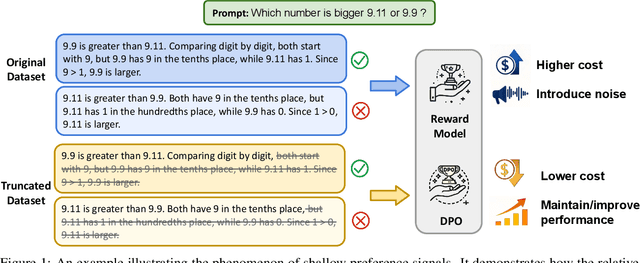
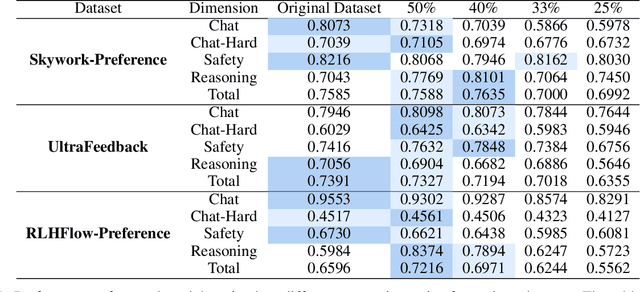

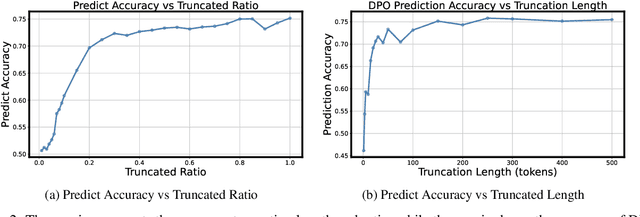
Abstract:Aligning large language models (LLMs) with human preferences remains a key challenge in AI. Preference-based optimization methods, such as Reinforcement Learning with Human Feedback (RLHF) and Direct Preference Optimization (DPO), rely on human-annotated datasets to improve alignment. In this work, we identify a crucial property of the existing learning method: the distinguishing signal obtained in preferred responses is often concentrated in the early tokens. We refer to this as shallow preference signals. To explore this property, we systematically truncate preference datasets at various points and train both reward models and DPO models on the truncated data. Surprisingly, models trained on truncated datasets, retaining only the first half or fewer tokens, achieve comparable or even superior performance to those trained on full datasets. For example, a reward model trained on the Skywork-Reward-Preference-80K-v0.2 dataset outperforms the full dataset when trained on a 40\% truncated dataset. This pattern is consistent across multiple datasets, suggesting the widespread presence of shallow preference signals. We further investigate the distribution of the reward signal through decoding strategies. We consider two simple decoding strategies motivated by the shallow reward signal observation, namely Length Control Decoding and KL Threshold Control Decoding, which leverage shallow preference signals to optimize the trade-off between alignment and computational efficiency. The performance is even better, which again validates our hypothesis. The phenomenon of shallow preference signals highlights potential issues in LLM alignment: existing alignment methods often focus on aligning only the initial tokens of responses, rather than considering the full response. This could lead to discrepancies with real-world human preferences, resulting in suboptimal alignment performance.
A Systematic Survey of Automatic Prompt Optimization Techniques
Feb 24, 2025Abstract:Since the advent of large language models (LLMs), prompt engineering has been a crucial step for eliciting desired responses for various Natural Language Processing (NLP) tasks. However, prompt engineering remains an impediment for end users due to rapid advances in models, tasks, and associated best practices. To mitigate this, Automatic Prompt Optimization (APO) techniques have recently emerged that use various automated techniques to help improve the performance of LLMs on various tasks. In this paper, we present a comprehensive survey summarizing the current progress and remaining challenges in this field. We provide a formal definition of APO, a 5-part unifying framework, and then proceed to rigorously categorize all relevant works based on their salient features therein. We hope to spur further research guided by our framework.
DebateQA: Evaluating Question Answering on Debatable Knowledge
Aug 02, 2024



Abstract:The rise of large language models (LLMs) has enabled us to seek answers to inherently debatable questions on LLM chatbots, necessitating a reliable way to evaluate their ability. However, traditional QA benchmarks assume fixed answers are inadequate for this purpose. To address this, we introduce DebateQA, a dataset of 2,941 debatable questions, each accompanied by multiple human-annotated partial answers that capture a variety of perspectives. We develop two metrics: Perspective Diversity, which evaluates the comprehensiveness of perspectives, and Dispute Awareness, which assesses if the LLM acknowledges the question's debatable nature. Experiments demonstrate that both metrics align with human preferences and are stable across different underlying models. Using DebateQA with two metrics, we assess 12 popular LLMs and retrieval-augmented generation methods. Our findings reveal that while LLMs generally excel at recognizing debatable issues, their ability to provide comprehensive answers encompassing diverse perspectives varies considerably.
Truthful Dataset Valuation by Pointwise Mutual Information
May 28, 2024Abstract:A common way to evaluate a dataset in ML involves training a model on this dataset and assessing the model's performance on a test set. However, this approach has two issues: (1) it may incentivize undesirable data manipulation in data marketplaces, as the self-interested data providers seek to modify the dataset to maximize their evaluation scores; (2) it may select datasets that overfit to potentially small test sets. We propose a new data valuation method that provably guarantees the following: data providers always maximize their expected score by truthfully reporting their observed data. Any manipulation of the data, including but not limited to data duplication, adding random data, data removal, or re-weighting data from different groups, cannot increase their expected score. Our method, following the paradigm of proper scoring rules, measures the pointwise mutual information (PMI) of the test dataset and the evaluated dataset. However, computing the PMI of two datasets is challenging. We introduce a novel PMI measuring method that greatly improves tractability within Bayesian machine learning contexts. This is accomplished through a new characterization of PMI that relies solely on the posterior probabilities of the model parameter at an arbitrarily selected value. Finally, we support our theoretical results with simulations and further test the effectiveness of our data valuation method in identifying the top datasets among multiple data providers. Interestingly, our method outperforms the standard approach of selecting datasets based on the trained model's test performance, suggesting that our truthful valuation score can also be more robust to overfitting.
The Evolution of the Interplay Between Input Distributions and Linear Regions in Networks
Nov 07, 2023

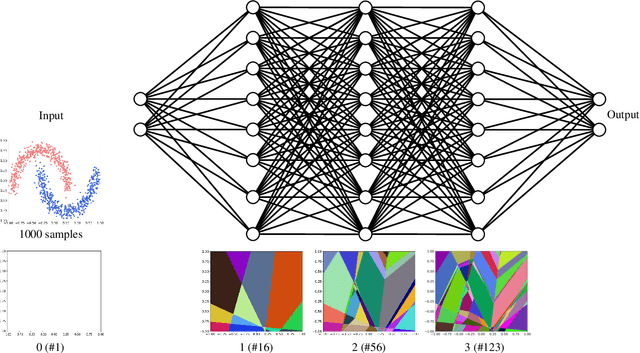

Abstract:It is commonly recognized that the expressiveness of deep neural networks is contingent upon a range of factors, encompassing their depth, width, and other relevant considerations. Currently, the practical performance of the majority of deep neural networks remains uncertain. For ReLU (Rectified Linear Unit) networks with piecewise linear activations, the number of linear convex regions serves as a natural metric to gauge the network's expressivity. In this paper, we count the number of linear convex regions in deep neural networks based on ReLU. In particular, we prove that for any one-dimensional input, there exists a minimum threshold for the number of neurons required to express it. We also empirically observe that for the same network, intricate inputs hinder its capacity to express linear regions. Furthermore, we unveil the iterative refinement process of decision boundaries in ReLU networks during training. We aspire for our research to serve as an inspiration for network optimization endeavors and aids in the exploration and analysis of the behaviors exhibited by deep networks.
 Add to Chrome
Add to Chrome Add to Firefox
Add to Firefox Add to Edge
Add to Edge